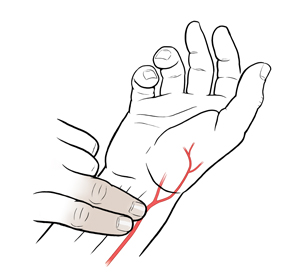A
B
C
D
E
F
G
H
I
J
K
L
M
N
O
P
Q
R
S
T
U
V
W
X
Y
Z
Click a letter to see a list of conditions beginning with that letter.
Click 'Topic Index' to return to the index for the current topic.
Click 'Library Index' to return to the listing of all topics.
Taking Digoxin
Digoxin helps slow your heartbeat. It also helps your heart beat stronger. Healthcare providers sometimes use this treatment for heart failure or atrial fibrillation. Your healthcare provider may have other reasons to prescribe digoxin. Take your medicine as your healthcare provider directs. Use the tips below.
How to take digoxin
-
Take digoxin once a day, or as directed. Try to take it at the same time each day.
-
Check your pulse before you take your digoxin. If your pulse is under 60 beats per minute (or the rate that your healthcare provider advises for you), wait 5 minutes. Then check your pulse again. If it’s still under 60, call your healthcare provider. If your pulse is normal, take your digoxin.
-
Don't stop taking digoxin unless your healthcare provider tells you to. This could cause serious problems.
-
Review all prescription medicines with your healthcare provider and pharmacist. These include over-the-counter medicines, vitamins, and supplements. Ask if any will affect the digoxin.
-
If you have a history of kidney problems, you may not be able to take digoxin. Talk about this with your healthcare provider.
If you miss a dose
-
Take it as soon as you remember if no more than 12 hours have passed from the time you usually take it. The next day, take it at the usual time.
-
Don't take the dose if more than 12 hours have passed from the time you usually take it. The next day, take it at the usual time.
-
Never take more than 1 dose of digoxin at a time.
How to take your pulse
-
Place your first 2 fingers on the inside of your wrist below the base of the thumb. Press lightly.
-
Count the number of beats for 1 full minute. A normal resting pulse is between 60 and 100 beats per minute.

When to call your healthcare provider
You may need to have your digoxin levels watched. This depends on how well your kidneys are working. It also depends on whether you take medicines that may make the levels of digoxin increase or decrease. You may need the levels checked if you are having side effects from the medicine. Some side effects can be life-threatening if the digoxin levels become higher than normal in your body. Call your healthcare provider before you take your next dose of digoxin if you have any of these symptoms:
-
Nausea, vomiting, diarrhea, or loss of appetite
-
Blurred or yellowed vision
-
Extreme tiredness
-
Pulse that is fast, irregular, or below 60 beats per minute, along with unusual chest pain, lightheadedness, or trouble breathing
-
Drowsiness or confusion
-
Mild trouble breathing
-
Blurred or double vision, or you see green or yellow halos around lights
-
Swelling in your feet or ankles
-
Sudden weight gain
When to call 911
Call 911 or get care right away at the nearest emergency department if any of the following occur:
-
Fainting or lightheadedness
-
Chest pain, or pain that goes to the shoulder, neck, or jaw
-
Severe trouble breathing
-
Pulse that is unusually fast, irregular, or below 60 beats per minute, along with unusual chest pain, lightheadedness, or trouble breathing
Online Medical Reviewer:
Ronald Karlin MD
Online Medical Reviewer:
Stacey Wojcik MBA BSN RN
Online Medical Reviewer:
Steven Kang MD
Date Last Reviewed:
3/1/2022
© 2000-2025 The StayWell Company, LLC. All rights reserved. This information is not intended as a substitute for professional medical care. Always follow your healthcare professional's instructions.